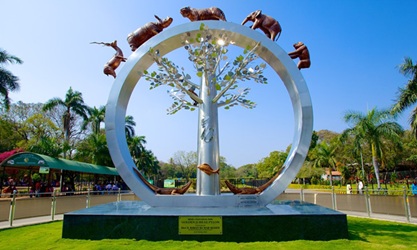Why in News ?
A Biosafety Level-3 (BSL-3) laboratory will soon be established at Nehru Zoological Park, Hyderabad; it will be the first in-house facility of its kind in South India.

Objective and Significance
- The lab will enable rapid diagnosis of infectious diseases, post-mortem analysis and research on zoonotic diseases (animal to human infections) with strict safety protocols. This will accelerate the prevention and control of epidemics.
- Currently, the park is dependent on external laboratories for disease diagnosis, leading to loss of both time and resources.
Development Direction
- The existing mini-lab will be converted into a high-security BSL-3 lab by upgrading it with state-of-the-art equipment and required infrastructure.
- Discussions/collaborations are underway with the following institutions:
- Telangana Veterinary Biological and Research Institute
- PV Narasimha Rao Telangana Veterinary University
- Other Government Research Institutes
Available facilities and future strategy
- After lab becomes operational:
- Real-time disease diagnosis
- Post-mortem to quickly ascertain the cause of animal death
- Assist in disease prevention and long-term strategy formulation in the zoo
- Currently, area-wise fecal samples are sent from the park to BRI (Biological Research Institute) where the anthelmintic load is confirmed. An in-house lab will expedite the process.
- The park already has a dedicated animal hospital and quarantine facility where new or rescued animals are health tested and monitored; these will now become more effective.
Nehru Zoological Park, Hyderabad
- Location: Bahadurpura, Hyderabad, Telangana
- Year of Establishment: 1963
- Name: Named after India's first Prime Minister Pandit Jawaharlal Nehru
- Area: Spread over about 380 acres
- Type: It is one of the largest and modern zoos in India, developed on the principle of "open zoo", i.e. animals are kept in open enclosures in a more natural environment.
|
Q. What is the main objective of the proposed Biosafety Level-3 (BSL-3) Lab at Nehru Zoological Park, Hyderabad ?
(a) Promoting wildlife tourism
(b) Quick diagnosis and research of infectious diseases
(c) Organizing exhibitions on wildlife conservation
(d) Increasing animal feed production
|